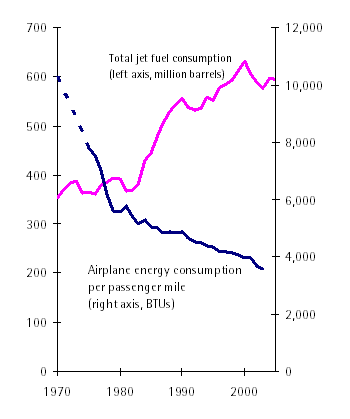Get out your propeller beanies, folks. I’m going into full-on geek mode.
On Monday I mentioned that—despite my family’s best efforts to cut back on our CO2 emissions by reducing how much we fly—the world has conspired to defeat us. Sure, we’re flying less, but the rest of our extended family is flying more as a consequence.
One commentor asked if I shouldn’t forget all the personal sacrifice fol-de-rol, and just work to convince Boeing to build more efficient planes.
Oh, if only it were so easy…
First off Boeing is making more efficientplanes—and sales are, for lack of a better term, starting to take off. Of course, it’ll take years for the new planes to make a substantial dent in fuel consumption of the world’s airliner fleet; but over time, yes, we can expect the world’s airlines to gradually take us from place to place using less fuel per trip.
This is really a continuation of a long-standing trend: measured per passenger mile, air travel has grown steadily more efficient for decades. Better engines consume less fuel per mile, while computerized ticketing & scheduling systems have made sure that each seat is filled, reducing waste. As a result, flying a mile is now about three times more fuel efficient than in 1970. (I could barely believe this when I first read it; but see table 2-12, here.)
But from a climate perspective it doesn’t really matter how efficient each trp is. What really matters is the total impact of flying. Unfortunately, even as the efficiency of any given trip has soared, total fuel consumption has taken flight as well: the US consumes 70 percent more jet fuel today than in 1970. (See Table 5-11, here.)
In the chart below, the blue line represents energy consumed per passenger mile—the lower the line goes, the more efficient the air transportation system is. The pink line represents total jet fuel consumption; the higher it goes, the more fuel is used, total, by all airplanes.
As you can see, even as plane travel got more efficient, the total impact of flying continued to rise; efficiency gains were overwhelmed by gains in population and—perhaps more importantly—income, particularly among wealthier people who tend to fly the most.
The big point here: efficiency alone just isn’t enough to carry the day. If we’re actually going to protect the climate, we’ve got to do much more than just wait for our planes to get more efficient. We’ve also got to focus on how much we fly, both individually and as a culture—which is going to mean a combination of personal choices and the right kinds of incentives to reduce the impact of our travel.










Dan
…efficiency alone just isn’t enough to carry the day. If we’re actually going to protect the climate, we’ve got to do much more than just wait for our planes to get more efficient. We’ve also got to focus on how much we fly…Tell that to Amory Lovins. ;o)But this is exactly correct. Our consumption and technology are the drivers here. We should gain efficiencies in addition to reducing per capita consumption in the short run. Of course, oil prices are contributing to consumption reduction, as driving is taking a bit more of our income.
Paul
I appreciate the conscietiousness, Clark, but it’s a bit of a fool’s game. There are already “feedback” mechanisms in place to encourage more efficient air travel. Airlines are motivated to lower fuel costs, so Boeing is motivated to increase efficiency. Yes, we should all minimize travel, but the larger environmental gains are to be made where there are no “feedback” mechanisms in place. For example, there is no mechanism in place to minimize the pesticiding of the countryside. It in fact costs farmers to be registered organic! So buy organic and let’s make it worth their while! There are few or no mechanisms in place to encourage local business or “water-friendly” development or ….. These are the places where our choices will make the most difference because there is no other feedback system.
Levin
Rail travel could provide a more efficient alternative, if we had a new high-speed passenger line from Vancouver BC to San Diego. The existing tracks don’t count, because ever since the 1960’s, freight trains have had priority over passenger trains, so the Amtrak schedule is unpredictable. Has Sightline done any research into the feasibility of giving Amtrak first priority, or building new high-speed tracks?
c-bird
I think I was the one who said let’s focus on building better airplanes. Taking another crack at this – the total (human/intellectual) energy put into this problem is the sum of the energy that has a “natural mechanism” (ie profit motive in this case) and the energy individuals put into adjusting their lives to minimize air travel. As Clark points out, the impact of the natural incentive Boeing has to make more efficient planes is dwarfed by increased demand, so total fuel consumption and pollution rise regardless. Ok then – put all that other human energy into building flying machines that take fossil fuels out of the equation entirely. Anyone know if Boeing/others are working on this? Granted, a solution in that direction would be a long way off regardless, and in the meantime carbon offset programs and other mechanisms that reduce demand for and/or impact of flying are needed.
kitchell
Hello! I wonder whether any of you have friends whose main topic of conversation is which country they last visited? The topics are about latest adventures- in Mexico, China, France, Costa Rica, you name it. Going to Paris for birthdays, etc. Since I worry about global warming, what do you recommend I talk about- I am thinking of doing more travel reading, and talking about the vicarious trips (in the books) I have been taking.